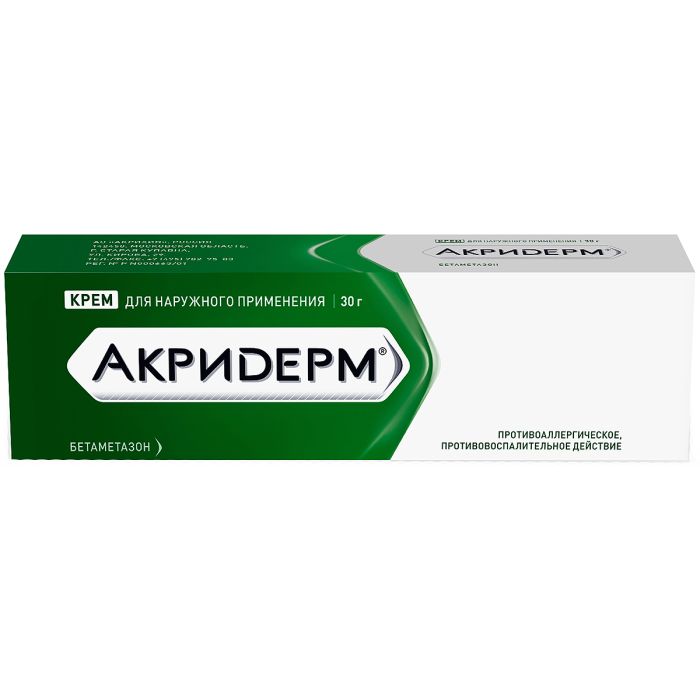Akriderm cream d / pl. approx. 0.05% tube 30g
Dosage:
0.05% x 15g
0.05% x 30g
500mg + 100mg + 1g x 15g
500mg + 100mg + 1g x 30g
Release form:
Cream
Ointment
Category
Psoriasis
Scope of the drug
Dermatology
Release form
Cream
Manufacturer country
Russia
Package quantity, pcs
one
Release form, composition and packaging
Cream for external use 0.05% white or off-white
100 g
betamethasone dipropionate in terms of 100% substance 0.064 g,
which is equivalent to betamethasone 0.05 g
methyl parahydroxybenzoate - 0.2 g, solid paraffin - 9 g, petroleum jelly - 3 g, propylene glycol - 5 g, liquid paraffin - 18 g, emulsion wax - 7 g, disodium edetate - 0.1 g, sodium sulfite - 0.05 g, purified water - up to 100 r
15 g - aluminum tubes (1) - cardboard packs.
30 g - aluminum tubes (1) - cardboard packs.
50 g - aluminum tubes (1) - cardboard packs.
pharmachologic effect
GCS, has anti-inflammatory, antipruritic and vasoconstrictor effects. ''
Indications for use
allergic skin diseases (including acute, subacute and chronic contact dermatitis, occupational dermatitis, solar dermatitis, neurodermatitis, pruritus, dyshidrotic dermatitis)
acute and chronic forms of non-allergic dermatitis
psoriasis.
Contraindications for use
lupus
viral skin infections
vaccination
perioral dermatitis
rosacea (rosacea)
hypersensitivity to any component of the drug.
Dosage regimen
Akriderm should be applied in a thin layer to the affected areas 1-3 times / day, rubbing lightly.
The duration of treatment should be no more than 3 weeks
The use of Akriderm in children under the age of 12 is carried out under the supervision of a physician.
Overdose
Symptoms: excessive or prolonged use of local GCS can cause inhibition of the function of the pituitary-adrenal system, which can lead to the development of secondary adrenal cortex insufficiency and the appearance of symptoms of hypercortisolism, including Cushing's syndrome.
Treatment: Appropriate symptomatic treatment is indicated.
Acute symptoms of hypercortisolism are usually reversible.
Correction of electrolyte imbalance is indicated if necessary.
In the case of chronic toxic effects, a gradual abolition of GCS is recommended.
Side effect
Possible: burning, irritation and dryness of the skin, folliculitis, hypertrichosis, hypopigmentation, allergic contact dermatitis, skin atrophy, striae and prickly heat.
In case of side effects, you should consult a doctor.
Drug interactions
There were no clinically significant interactions with other drugs.
Application during pregnancy and lactation
Due to the fact that the safety of using local corticosteroids in pregnant women has not been established, the use of drugs of this class during pregnancy is justified only if the benefits to the mother clearly outweigh the possible harm to the fetus.
Drugs in this group should not be used by pregnant women in large doses for a long time.
Since it has not yet been established whether glucocorticosterones, when applied topically and systemically absorbed, can penetrate into breast milk, a decision should be made to stop breastfeeding or to discontinue the drug, taking into account how necessary its use for the mother.
Special instructions In the absence of the effect of treatment within two weeks, it is recommended to consult your doctor in order to possibly clarify the diagnosis.
If irritation or hypersensitivity reaction is noted during the use of the drug, treatment should be discontinued and consult your doctor.
For secondary fungal or bacterial infections, appropriate medications should be used.
In the absence, at the same time, of a quick positive effect, the use of Akriderm should be discontinued until all signs of infection are eliminated
Long-term use of the drug on the skin is not recommended.
Do not use Akriderm in the eye area, because
in this case, the development of cataracts, glaucoma, fungal infection and exacerbation of herpes infection is possible
Use in pediatrics
Children may be more receptive
Name ENG
AKRIDERM GK
Clinical and pharmacological group
GCS for local use + antibiotic aminoglycoside + antifungal agent
ATX code
Betamethasone in combination with other drugs
Dosage
0.05% x 30g
Structure
betamethasone dipropionate 64 mg, which corresponds to the content of betamethasone 50 mg.
Excipients: methyl parahydroxybenzoate - 0.2 g, solid paraffin - 9 g, petroleum jelly - 3 g, propylene glycol - 5 g, liquid paraffin - 18 g, emulsion wax - 7 g, disodium edetate - 0.1 g, sodium sulfite - 0.05 g, purified water - up to 100 g.
Indications
allergic skin diseases (including acute, subacute and chronic contact dermatitis, occupational dermatitis, solar dermatitis, neurodermatitis, pruritus, dyshidrotic dermatitis)
acute and chronic forms of non-allergic dermatitis
psoriasis.
Storage conditions and periods
At a temperature of 15-25 degrees.
Expiration date: 4 years
INN / Active ingredient
betamethasone
Contraindications
lupus
viral skin infections
vaccination
perioral dermatitis
rosacea (rosacea)
hypersensitivity to any component of the drug.
Specifications
Category
Psoriasis
Scope of the drug
Dermatology
Release form
Cream
Manufacturer country
Russia
Package quantity, pcs
one
Scope of application
Dermatology
,
Allergology
Minimum age from
2 years old
Way of introduction
Locally
,
Outwardly
Vacation conditions
Without recipe
Brand name
Akrikhin
The amount of the dosage form in the primary package
30 g
Primary packaging type
Tuba
Type of consumer packaging
Pack of cardboard
Pharmaco-therapeutic group
Topical glucocorticosteroid
Anatomical and therapeutic characteristics
D07AC01 Betamethasone
Dosage form
Cream for external use
Expiration date in days
1460
Dosage (volume) of the substance in the preparation
betamethasone dipropionate 64 mg
Package weight, g
45
Mode of application
:
Akriderm should be applied in a thin layer to the affected areas 1-3 times / day, rubbing lightly.
The duration of treatment should be no more than 3 weeks. The use of Akriderm in children under the age of 12 is carried out under the supervision of a doctor.
Information on technical characteristics, delivery set, country of manufacture

